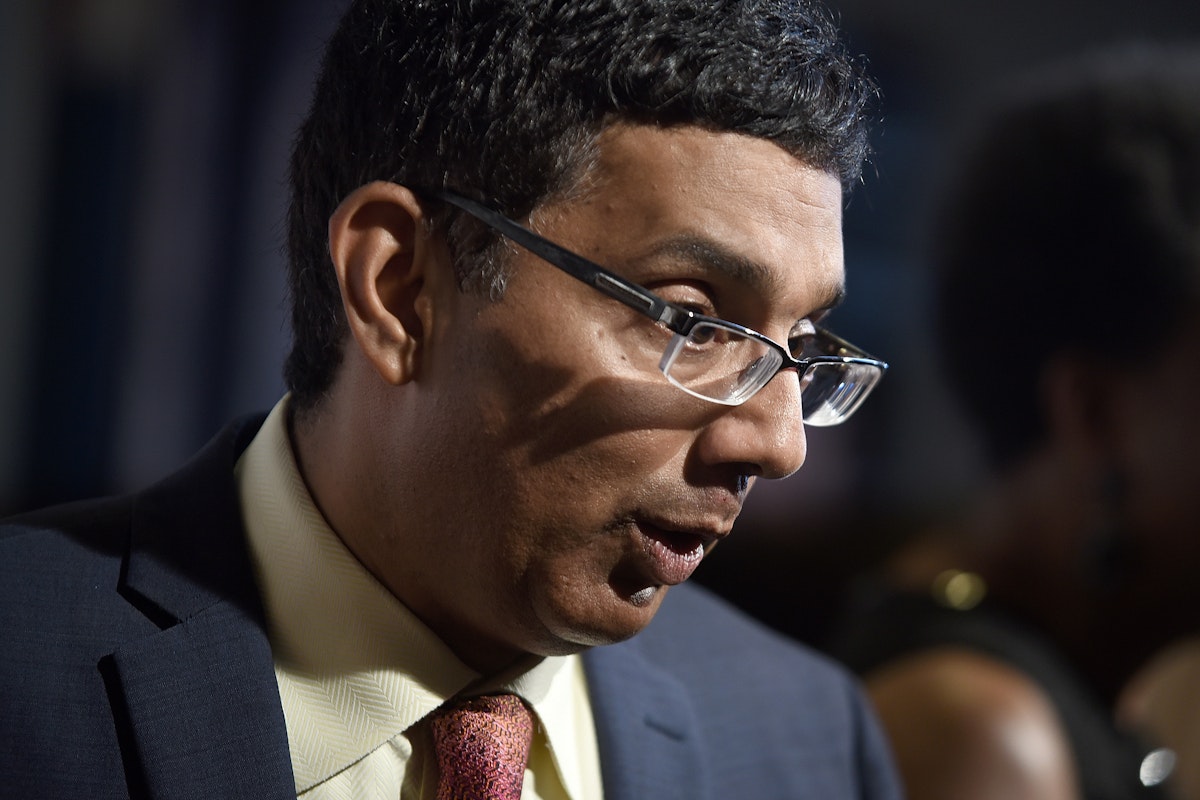Leading Election Denier Finally Says the Quiet Part Out Loud
Dinesh D’Souza, the conservative filmmaker behind the election denialist fable 2,000 Mules, revealed that the data that underpinned his supposedly incontrovertible claims of fraudulent voting was actually a complete sham.In the 2022 film, a Texas-based “election integrity” organization called True the Vote claimed to have reviewed cell phone geotracking data from five 2020 battleground states that traced the movements of ballot “mules” who had been paid by liberal nonprofits to stuff ballot boxes. D’Souza’s film purported that hundreds of thousands of illegal ballots had been cast, tipping the scales for Joe Biden. The movie has been widely debunked by pretty much everyone, now including its own filmmaker. A statement from D’Souza, quietly posted to D’Souza Media’s website early Monday, revealed that the geolocation data that he called “the premise of the film” wasn’t actually real. “During the production of this film, as a supplement to the geolocation data, True the Vote provided my team with ballot drop box surveillance footage that had been obtained through open records requests. We were assured that the surveillance videos had been linked to geolocation cell phone data, such that each video depicted an individual who had made at least 10 visits to drop boxes. Indeed, it is clear from the interviews within the film itself that True the Vote was correlating the videos to geolocation data,” D’Souza wrote. “We recently learned that surveillance videos used in the film may not have actually been correlated with the geolocation data,” the statement read. D’Souza downplayed this particular revelation’s impact on the integrity of True the Vote, and the film altogether.“We operated in good faith and in reliance on True the Vote. We continue to have confidence in their work and also in the basic message of ‘2000 Mules,’” he wrote, adding that he would “continue to have faith” in the “underlying geolocation data and analysis.”It seems the statement’s main purpose was to apologize to one individual: Mark Andrews, a Georgia voter who sued D’Souza after he was falsely depicted as one of the “mules.”“I now understand that the surveillance videos used in the film were characterized on the basis of inaccurate information provided to me and my team. If I had known then that the videos were not linked to geolocation data, I would have clarified this and produced and edited the film differently,” D’Souza said.The Georgia Bureau of Investigation determined in 2022 that Andrews had been dropping off ballots for members of his own family, and Andrews filed a defamation lawsuit against D’Souza, True the Vote, and the movie’s publisher, Salem Media Group Inc. The publisher issued an apology to Andrews and ultimately retracted the movie from its platforms. “Again, I apologize to Mr. Andrews. I make this apology not under the terms of a settlement agreement or other duress, but because it is the right thing to do, given what we have now learned,” D’Souza wrote. “While I do not believe Mr. Andrews was ever identified by the film or book, I am sorry for any harm he believes he and his family has suffered as a result of ‘2000 Mules.’”

Dinesh D’Souza, the conservative filmmaker behind the election denialist fable 2,000 Mules, revealed that the data that underpinned his supposedly incontrovertible claims of fraudulent voting was actually a complete sham.
In the 2022 film, a Texas-based “election integrity” organization called True the Vote claimed to have reviewed cell phone geotracking data from five 2020 battleground states that traced the movements of ballot “mules” who had been paid by liberal nonprofits to stuff ballot boxes. D’Souza’s film purported that hundreds of thousands of illegal ballots had been cast, tipping the scales for Joe Biden. The movie has been widely debunked by pretty much everyone, now including its own filmmaker.
A statement from D’Souza, quietly posted to D’Souza Media’s website early Monday, revealed that the geolocation data that he called “the premise of the film” wasn’t actually real.
“During the production of this film, as a supplement to the geolocation data, True the Vote provided my team with ballot drop box surveillance footage that had been obtained through open records requests. We were assured that the surveillance videos had been linked to geolocation cell phone data, such that each video depicted an individual who had made at least 10 visits to drop boxes. Indeed, it is clear from the interviews within the film itself that True the Vote was correlating the videos to geolocation data,” D’Souza wrote.
“We recently learned that surveillance videos used in the film may not have actually been correlated with the geolocation data,” the statement read.
D’Souza downplayed this particular revelation’s impact on the integrity of True the Vote, and the film altogether.
“We operated in good faith and in reliance on True the Vote. We continue to have confidence in their work and also in the basic message of ‘2000 Mules,’” he wrote, adding that he would “continue to have faith” in the “underlying geolocation data and analysis.”
It seems the statement’s main purpose was to apologize to one individual: Mark Andrews, a Georgia voter who sued D’Souza after he was falsely depicted as one of the “mules.”
“I now understand that the surveillance videos used in the film were characterized on the basis of inaccurate information provided to me and my team. If I had known then that the videos were not linked to geolocation data, I would have clarified this and produced and edited the film differently,” D’Souza said.
The Georgia Bureau of Investigation determined in 2022 that Andrews had been dropping off ballots for members of his own family, and Andrews filed a defamation lawsuit against D’Souza, True the Vote, and the movie’s publisher, Salem Media Group Inc. The publisher issued an apology to Andrews and ultimately retracted the movie from its platforms.
“Again, I apologize to Mr. Andrews. I make this apology not under the terms of a settlement agreement or other duress, but because it is the right thing to do, given what we have now learned,” D’Souza wrote. “While I do not believe Mr. Andrews was ever identified by the film or book, I am sorry for any harm he believes he and his family has suffered as a result of ‘2000 Mules.’”



